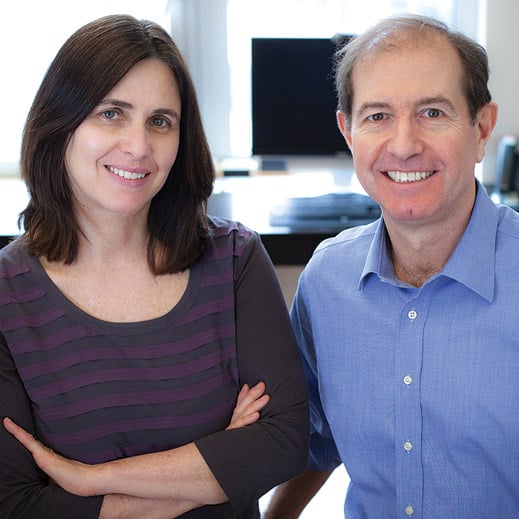On June 15, EECS professor Shafi Goldwasser and engineering professor Silvio Micali will receive the A. M. Turing Award for their pioneering work in cryptography and complexity theory. The two developed new mechanisms for encrypting and securing information, which are widely applicable today in communication protocols, Internet transactions, and cloud computing. They also made fundamental advances in the theory of computational complexity, which focuses on classifying computational problems according to their inherent difficulty.

Goldwasser and Micali were credited with “revolutionizing the science of cryptography” and developing the gold standard for enabling secure Internet transactions. The $250,000 award, presented annually by the Association for Computing Machinery, is often described as the “Nobel Prize in computing.”
Goldwasser and Micali began collaborating as graduate students at the University of California, Berkeley, in 1980. While toying with the idea of how to securely play poker over the phone, they devised a scheme for encrypting single bits of data. From there, they proved that their scheme could be scaled up to tackle much more complex problems.
Their 1982 paper “Probabilistic Encryption” laid the framework for modern cryptography by pioneering randomized methods for encryption and introducing formal security definitions that remain in use to this day. They proved that encryption schemes must be randomized, with many possible encrypted texts corresponding to each message.
In a 1985 paper with Charles Rackoff, they introduced knowledge complexity, a concept that deals with hiding information from an adversary and offers a quantifiable measure of how much useful information can be extracted from a conversation. The paper initiated the idea of zero-knowledge proofs, in which interaction (the ability of provers and verifiers to send each other messages) and probabilism (in this case, using the result of several coin tosses to decide which messages to send) make it possible to establish a fact through a statistical argument without any additional information as to why it is true.
Past MIT recipients of the Turing Award include Barbara Liskov; Ronald L. Rivest; Manuel Blum ’59, SM ’61, PhD ’64, who served as thesis advisor to both Goldwasser and Micali at UC Berkeley; Butler Lampson; Fernando Corbato, PhD ’56; Ivan Sutherland, PhD ’63; John McCarthy; Marvin Minsky; and Alan Perlis, SM ’49, PhD ’50.
Keep Reading
Most Popular
Large language models can do jaw-dropping things. But nobody knows exactly why.
And that's a problem. Figuring it out is one of the biggest scientific puzzles of our time and a crucial step towards controlling more powerful future models.
The problem with plug-in hybrids? Their drivers.
Plug-in hybrids are often sold as a transition to EVs, but new data from Europe shows we’re still underestimating the emissions they produce.
How scientists traced a mysterious covid case back to six toilets
When wastewater surveillance turns into a hunt for a single infected individual, the ethics get tricky.
Google DeepMind’s new generative model makes Super Mario–like games from scratch
Genie learns how to control games by watching hours and hours of video. It could help train next-gen robots too.
Stay connected
Get the latest updates from
MIT Technology Review
Discover special offers, top stories, upcoming events, and more.